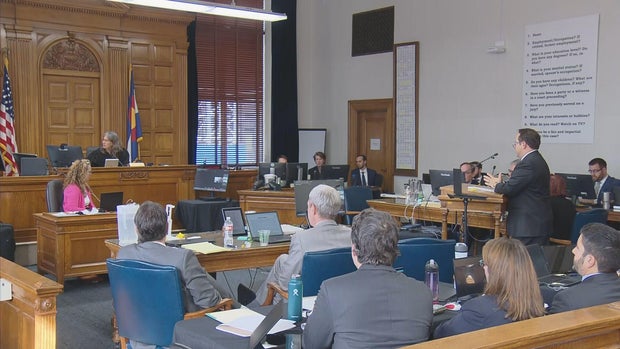A Denver District Court judge has issued a ruling that former President Donald Trump can appear on the Colorado primary ballot. The decision came down just before 5 p.m. Friday. At issue was whether he was barred from the ballot by a provision of the U.S. Constitution that forbids those who “engaged in insurrection” from holding office.
Colorado Secretary of State Jena Griswold released this statement shortly after the ruling, “The Court determined that Donald Trump is eligible to be placed on the Colorado ballot in the March Presidential Primary. This decision may be appealed. As Secretary of State, I will always ensure that every voter can make their voice heard in free and fair elections.”
Advocates this year have been trying to remove Trump from the ballot in Colorado and other states under Section Three of the 14th Amendment, which bars from office those who swore an oath to uphold the U.S. Constitution and then “engaged in insurrection” against it. The measure has only been used a handful of times since the period after the Civil War.
CBS
In her decision, Wallace said she found that Trump did in fact “engage in insurrection” on Jan. 6 and rejected his attorneys’ arguments that he was simply engaging in free speech. Normally, that would be enough to disqualify him under Section 3, but she said she couldn’t do so for a presidential candidate.
Section 3 does not specifically refer to the presidency, as it does members of the U.S. Senate or House of Representatives. Instead, the clause refers to “elector of President and Vice President,” along with civil and military offices.
“Part of the Court’s decision is its reluctance to embrace an interpretation which would disqualify a presidential candidate without a clear, unmistakable indication that such is the intent of Section Three,” the judge wrote.
Closing arguments in the lawsuit, which was filed by the left-leaning group Citizens for Responsibility and Ethics in Washington, wrapped up on Wednesday. Sean Grimsley, an attorney for the petitioners, argued that Trump engaged in an insurrection by inciting a violent mob to attack the U.S. Capitol on Jan. 6 to try to stop the peaceful transfer of power. He says that makes him ineligible to hold office under the 14th Amendment. Trump attorney Scott Gessler says there’s no evidence that Trump intended to incite violence and violence, he says, doesn’t equal an insurrection.
Gessler said the lawsuit amounts to election interference and is based entirely on the Jan. 6 Committee’s report which he says is completely one-sided.
“The petitioners are asking this court to do something that’s never been done in the history of the United States,” Gessler said. “The evidence doesn’t come close to allowing the court to do it.”
The trial, which ended two weeks ago, included testimony from D.C. riot police, rallygoers, constitutional experts, and two members of Congress.
The Colorado plaintiffs’ attorney, Sean Grimsley, told the judge during Wednesday’s hearing that the evidence was clear.
“We are here because, for the first time in our nation’s history, the president of the United States engaged in an insurrection,” he said, summing up their case. “Now he wants to be president again. The Constitution does not allow that.”
If they can keep Trump off the primary ballot in enough states, advocates hope to keep him from getting the needed delegates to secure the Republican presidential nomination.
Regardless of the judge’s decision, the case is all but certain to be appealed all the way to the U.S. Supreme Court.
Similar lawsuits challenging Trump’s ballot eligibility under the 14th Amendment have failed recently in Michigan and Minnesota. The Minnesota Supreme Court dodged the question of whether the provision applies to Trump, who is so far dominating the Republican presidential primary. It dismissed a lawsuit to toss him off that state’s primary ballot by saying that political parties can allow whomever they want to qualify for primaries. The court left the door open for a general election challenge if Trump becomes the GOP nominee. A Michigan judge dismissed another lawsuit seeking to bounce Trump from that state’s primary ballot with a more sweeping ruling. He said whether the provision applies to the former president is a “political question” to be settled by Congress, not judges. The liberal group that filed the Michigan case, Free Speech For People, said it plans to appeal the decision.
The Trump campaign has called the lawsuits “election interference” and an “anti-democratic” attempt to stop voters from having the choice they want next November.
